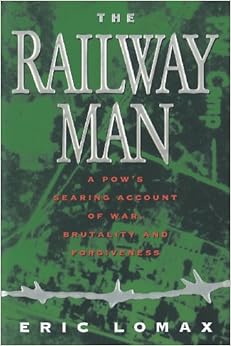Book blurb: Here is a remarkable true story of forgiveness--a tremendous testament to the courage that propels one toward remembrance, and finally, peace with the past. A classic war autobiography, The Railway Man is a powerful tale of survival and of the human capacity to understand even those who have done us unthinkable harm.
The Railway Man is Eric Lomax's memoir of growing up as a lover of trains, railroads and steam engines. It also tells of his imprisonment and later being in a camp.
First off: This is not a remarkable story of forgiveness. The forgiveness takes place within the last twenty pages of the novel. In addition, the villain -- such as he is-- does not show up until late in the novel. In fact, there really isn't much shown about individual Japanese captors. So if readers expect to see a long series of show-downs between the narrator and any individual Japanese prison guard, it's best to cast that expectation aside. The blurb --about forgiveness, etc-- is misleading. True, the narrator forgives a Japanese prison guard and understands why forgiveness is a healing thing but honestly that Japanese guard hardly matters.
Secondly: The book is not called "The Railway Man" for no reason. This book is about railways. About an only child's obsession with railways, about a teenaged kid's obsession with trains and engineering and how he and his fellow prisoners of war also ended up being trapped into working on the Japanese dream of a railroad. Again, the blurb hints at heart issues and even of spiritual memoirs. But the book is different. I did perk up when he talked about the self-righteous cultic petty evangelical Baptist Church he got pulled into. But then he didn't talk about it as much as he should have.
Thirdly: The book is well-written. Anyone who has ever had a repressed emotion --caused by unspeakable suffering and who has had that unspeakable suffering destroy his marriage should read this book. The sections on the destruction of his long marriage was wonderful. He married a girl he didn't know, one he had become engaged to before the way, but had to leave because of the war. They endured a painful non-communicative marriage because he kept his painful war experiences to himself. But he called her S in the narrative? Who does that? Even for privacy sake? Heck he spent about forty years with the woman! But the emotion in the book is so restrained -- even though the book is supposed to be about the narrator finally telling his heart. Emotion and human connectedness comes too little and too late in a novel where the passion of the author is for railways. And wow, all that passion! I'm easygoing but even I -- who prides herself on being a patient reader of things quirky, passionatem, and obsessional-- found myself skimming. I've read books on rubber, eels, etc. But there was always something that kept me enthralled. I don't know why I wasn't enthralled in this book. It's probably entirely my fault because other people have liked this book. I'm not saying it is a bad book. It isn't. There are some wonderful sections of railway history and British WWII POW history. But somehow...I started skimming around the last third of the book. I was looking for something I didn't or couldn't find.











No comments:
Post a Comment